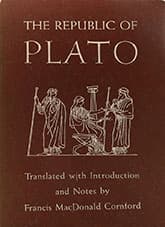The Republic
 Cornford translation, 1969 edition
Cornford translation, 1969 editionAlso known as
Plato's Republic
First publication
c.300 BCE
Literature form
Nonfiction
Genres
Philosophy, dialogue
Writing language
Ancient Greek
Author's country
Greece
Length
Approx. 51,000 words
Notable lines
I went down yesterday to the Piraeus with Glaucon the son of Ariston, that I might offer up my prayers to the goddess (Bendis, the Thracian Artemis.); and also because I wanted to see in what manner they would celebrate the festival, which was a new thing.
— First line, Benjamin Jowett translation
Admitting that women differ from men in capacity, do not men equally differ from one another? Has not nature scattered all the qualities which our citizens require indifferently up and down among the two sexes? and even in their peculiar pursuits, are not women often, though in some cases superior to men, ridiculously enough surpassed by them?
I really do not know as yet, but whither the argument may blow, thither we go.
...any musical innovation is full of danger to the whole State, and ought to be prohibited.
Those then who know not wisdom and virtue, and are always busy with gluttony and sensuality, go down and up again as far as the mean; and in this region they move at random throughout life, but they never pass into the true upper world; thither they neither look, nor do they ever find their way, neither are they truly filled with true being, nor do they taste of pure and abiding pleasure. Like cattle, with their eyes always looking down and their heads stooping to the earth, that is, to the dining-table, they fatten and feed and breed, and, in their excessive love of these delights, they kick and butt at one another with horns and hoofs which are made of iron; and they kill one another by reason of their insatiable lust. For they fill themselves with that which is not substantial, and the part of themselves which they fill is also unsubstantial and incontinent.
Thus shall we live dear to one another and to the gods, both while remaining here and when, like conquerors in the games who go round to gather gifts, we receive our reward. And it shall be well with us both in this life and in the pilgrimage of a thousand years which we have been describing.
— Last lines, Benjamin Jowett translation

